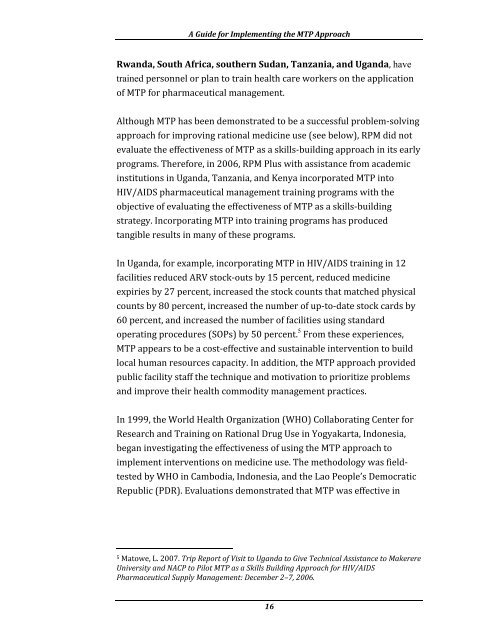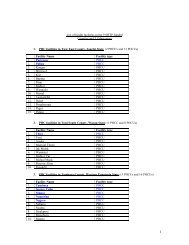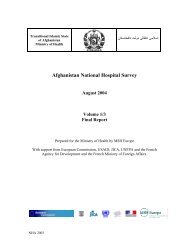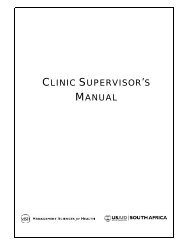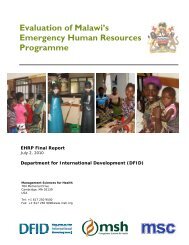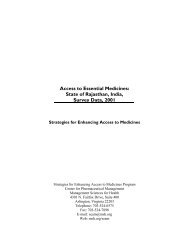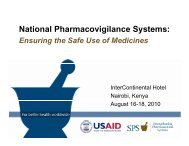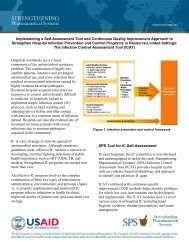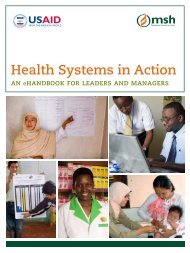A Guide for Implementing the Monitoring-Training-Planning (MTP ...
A Guide for Implementing the Monitoring-Training-Planning (MTP ...
A Guide for Implementing the Monitoring-Training-Planning (MTP ...
Create successful ePaper yourself
Turn your PDF publications into a flip-book with our unique Google optimized e-Paper software.
A <strong>Guide</strong> <strong>for</strong> <strong>Implementing</strong> <strong>the</strong> <strong>MTP</strong> Approach<br />
Rwanda, South Africa, sou<strong>the</strong>rn Sudan, Tanzania, and Uganda, have<br />
trained personnel or plan to train health care workers on <strong>the</strong> application<br />
of <strong>MTP</strong> <strong>for</strong> pharmaceutical management.<br />
Although <strong>MTP</strong> has been demonstrated to be a successful problem‐solving<br />
approach <strong>for</strong> improving rational medicine use (see below), RPM did not<br />
evaluate <strong>the</strong> effectiveness of <strong>MTP</strong> as a skills‐building approach in its early<br />
programs. There<strong>for</strong>e, in 2006, RPM Plus with assistance from academic<br />
institutions in Uganda, Tanzania, and Kenya incorporated <strong>MTP</strong> into<br />
HIV/AIDS pharmaceutical management training programs with <strong>the</strong><br />
objective of evaluating <strong>the</strong> effectiveness of <strong>MTP</strong> as a skills‐building<br />
strategy. Incorporating <strong>MTP</strong> into training programs has produced<br />
tangible results in many of <strong>the</strong>se programs.<br />
In Uganda, <strong>for</strong> example, incorporating <strong>MTP</strong> in HIV/AIDS training in 12<br />
facilities reduced ARV stock‐outs by 15 percent, reduced medicine<br />
expiries by 27 percent, increased <strong>the</strong> stock counts that matched physical<br />
counts by 80 percent, increased <strong>the</strong> number of up‐to‐date stock cards by<br />
60 percent, and increased <strong>the</strong> number of facilities using standard<br />
operating procedures (SOPs) by 50 percent. 5 From <strong>the</strong>se experiences,<br />
<strong>MTP</strong> appears to be a cost‐effective and sustainable intervention to build<br />
local human resources capacity. In addition, <strong>the</strong> <strong>MTP</strong> approach provided<br />
public facility staff <strong>the</strong> technique and motivation to prioritize problems<br />
and improve <strong>the</strong>ir health commodity management practices.<br />
In 1999, <strong>the</strong> World Health Organization (WHO) Collaborating Center <strong>for</strong><br />
Research and <strong>Training</strong> on Rational Drug Use in Yogyakarta, Indonesia,<br />
began investigating <strong>the</strong> effectiveness of using <strong>the</strong> <strong>MTP</strong> approach to<br />
implement interventions on medicine use. The methodology was field‐<br />
tested by WHO in Cambodia, Indonesia, and <strong>the</strong> Lao People’s Democratic<br />
Republic (PDR). Evaluations demonstrated that <strong>MTP</strong> was effective in<br />
5 Matowe, L. 2007. Trip Report of Visit to Uganda to Give Technical Assistance to Makerere<br />
University and NACP to Pilot <strong>MTP</strong> as a Skills Building Approach <strong>for</strong> HIV/AIDS<br />
Pharmaceutical Supply Management: December 2–7, 2006.<br />
16


